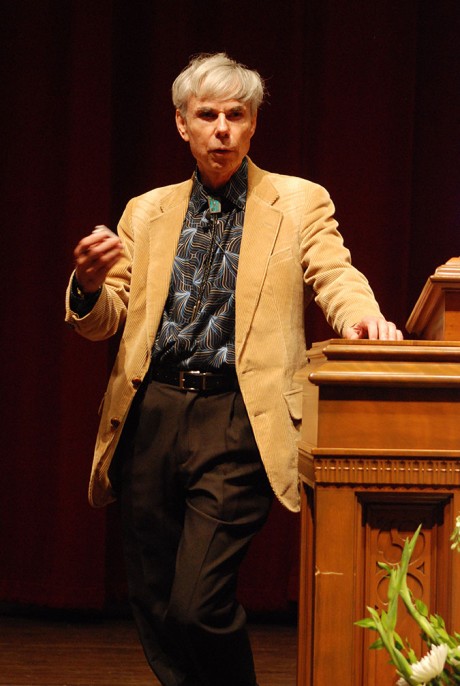
Douglas Hofstadter, Pulitzer Prize-winning author and professor of cognitive science at Indiana University, gave the 2012 Trinity University DeCoursey Lecture in two parts Monday, Oct. 29 and Tuesday, Oct. 30. Hofstadter’s two talks varied in content and covered both his own passion for Russian literature as well as his work in cognitive science and long-fought struggle with the question of self reference.
Hofstadter’s first lecture was primarily concerned with his own love of Alexander Pushkin’s novel in verse, Eugene Onegin. The novel, a Russian classic, is lauded in its home country but is almost entirely unknown in the United States. This disparity was one of the primary points of Hofstadter’s lecture. He lamented the novel’s unpopularity in the States while adding that he considers it to be “intoxicatingly beautiful, with marvelously florid prose.”
Hofstadter, in order to emulate many native Russians, took it upon himself to memorize the entirety of Eugene Onegin, after being introduced to it by a fellow author. After learning enough of the Russian language to do so, he began to challenge himself to translate any one stanza in the novel.
Having managed to translate several stanzas in his spare time, Hofstadter, after being disappointed with several translations of the novel, elected to complete an entire translation of the work on his own.
“I wanted to interact with the book in the deepest possible way,” Hofstadter said.
After speaking in depth on the specific structures of the novel, including the unique stanza and rhyme types, Hofstadter spoke about why he chose to stay loyal to the original rhyme scheme and described completing the final translations in the historic apartment of Pushkin himself.
The eventual published translation, however, was not a critical success, which Hofstadter linked to the academic attachment to the immensely popular translation by Vladimir Nabokov, as well as the general unpopularity of the novel outside of Russia.
“I wonder what the nature of a society like ours is that so little appreciates this work, especially in relation to Russia, whose average citizen is so familiar with it,” Hofstadter said.
Senior Sarah Applegate, enjoyed the lecture.
“He did a good job convincing me that reading [Eugene Onegin] was worthwhile. It’s a shame it’s not more popular in America.Now I’m just trying to figure out which translation to read,” Applegate said.
Hofstadter’s second lecture, entitled “You Are a Strange Loop,” covered one of the main topics of his life’s work: the issue of self reference. Speaking about how he was introduced to this problem at an early age with statements such as “this sentence is false,” he said of self reference: “I wasn’t frightened by it; I was fascinated by it.”
Utilizing examples such as a video camera recording the television which is displaying its output, Hofstadter formed a link between perception and self image, asking the question, “What happens when systems that perceive begin to have self image?”
Hofstadter went on to downplay the overall problems that revolve around the concept of self reference, commenting that everyday language makes use of self reference without it ever being an issue. However, he used both mosquitoes and heat-seeking missiles as examples of things that have perception, but not consciousness.
Hofstadter equated this with our own selves, saying “we, as systems, perceive the world, sort the world into complex categories, but we do not perceive the level at which causality truly occurs.”
This deficiency, Hofstadter noted in his talk, may lead to self-made illusions, such as perceiving that which is not truly there. Hofstadter closed his lecture on this note, saying “we are doomed to believe certain things that are not real.”
Hamilton Lee, a sophomore, described the contents of the lecture as “meta-cognition at its best,” adding that anyone even remotely interested in cognitive science should begin to consider looking into Hofstadter’s work.







